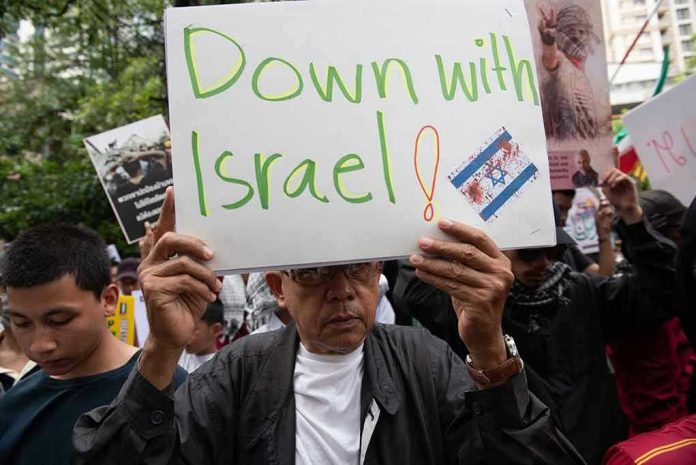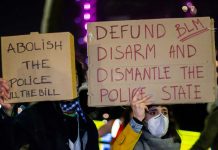
When Columbia University’s campus became the battleground for a heated protest about the Israel-Gaza conflict, the repercussions were swift and severe, with 80 students now facing disciplinary action. How did it come to this?
At a Glance
- Columbia University disciplines 80 students for disruptive protests.
- Protests centered around the Israel-Gaza conflict and university investments.
- The Trump administration has frozen federal funding over antisemitism concerns.
- Students face suspensions, expulsions, and potential degree revocations.
Columbia University Crackdown on Campus Protests
Columbia University, a traditional hub for student activism, finds itself in the spotlight once again, disciplining 80 students involved in protests over the Israel-Gaza conflict. These protests, demanding the university divest from companies linked to the Israeli government, escalated to the occupation of buildings and disruption of university operations. The administration now faces intense scrutiny over its handling of these protests.
The protests, which peaked in April and May 2024, saw students setting up encampments and occupying the Butler Library, coinciding with heightened federal scrutiny over allegations of antisemitism on campus. This led to the Trump administration freezing substantial federal research funding, pushing Columbia to take decisive action against the protests.
The Role of Key Stakeholders
The Columbia University administration is caught between student demands for social justice and federal demands for compliance with anti-discrimination laws. The University Judicial Board (UJB) investigated the protests and determined the disciplinary measures, which included suspensions, expulsions, and degree revocations. The administration is eager to restore order and regain access to the frozen research funds, making it imperative to comply with federal requirements.
Student groups like Columbia University Apartheid Divest and Columbia for Palestine have been at the forefront of these protests, motivated by a sense of solidarity with Palestinians and opposition to university investments in Israel-linked entities. These groups have accused the university of colluding with the Trump administration, vowing to continue their activism despite the disciplinary actions.
Current Developments and Impacts
As of July 22, 2025, Columbia announced disciplinary actions against over 70 students. The measures include probation, suspensions ranging from one to three years, and, for some, permanent expulsion. The university has stated it would not release individual disciplinary outcomes, but most students received two-year suspensions. Suspended students must submit apologies for reconsideration; refusal to do so results in expulsion.
These actions have sparked debates about free speech and academic freedom on campus. The university is negotiating with the federal government to unfreeze up to $1 billion in research grants, which is crucial for its research programs and financial stability. This case highlights the influence of federal policy on university governance and the intersection of higher education with national political agendas.
Broader Implications and Expert Opinions
The disciplinary actions at Columbia reflect a broader trend of heightened administrative responses to campus activism across the U.S. Higher education analysts note the growing pressure on universities to balance free expression with campus order and compliance with federal regulations. Legal scholars highlight the complex interplay between First Amendment rights, university policies, and federal anti-discrimination laws.
While some experts warn that harsh disciplinary measures could chill legitimate protest and academic freedom, others argue they are necessary to maintain institutional integrity. This case serves as a potential model or warning for other universities handling similar protests, potentially leading to stricter enforcement of campus policies nationwide.









